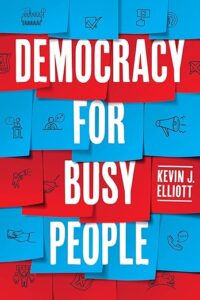
- A Book Review of Democracy for Busy People, by Kevin J. Elliott.
Kevin J. Elliott’s 2023 book, Democracy for Busy People, is for anyone interested in liberal democratic politics. The book is worthwhile for classical liberals in particular because it handles topics often passed over by classically liberal democratic commentators and takes opportunity cost seriously.
The introduction begins by explaining “busyness” and its relevance to democratic politics. In Part I, Elliott argues for a realistic minimum level of democratic participation. In Part II, he discusses institutional reform for a more inclusive democracy.
Busyness to Elliott is not limited to the demands of a high-powered career that plagues only some people. It affects everyone. Marginalized groups navigating discrimination are busy. Immigrants establishing social networks are busy. People are busy with caretaking, working, commuting, keeping house, maintaining and managing relationships, having hobbies, maintaining health and wellbeing, and more. Busyness affects how much time and effort people devote to politics. It does not, and should not, affect how entitled people are to democratic equality.
There’s more to life than politics. That should matter for politics.
Unequal busyness can’t be eliminated. Even in a world of superabundance, some people will (for example) choose to care for their family themselves rather than splitting the job with professional caregivers. This choice leaves less time for politics, just as it leaves less time for other pursuits.
Liberal democracy’s ability to be truly democratic depends on its ability to incorporate all voices. If people are too busy for politics, their voices will be missed.
What does democracy demand?
Elliott believes that democracy needs citizen participation to work. He insists that we have a right to other priorities. So he argues that while people have a duty to participate in democracy, they are also entitled to minimally demanding citizenship. (p. 83-84)
Demandingness is a going concern for democratic theory (Elliott provides helpful summaries of relevant work), but it’s also an old one. Benjamin Constant in The Liberty of the Ancients Compared to that of the Moderns worried about it two centuries ago.
Constant said that the concerns of modernity—”peaceful enjoyment and private independence”—compete for time and attention with the ancient (think Greek and Roman) ideas of liberty-as-participation in governance, the “active and constant participation in collective power.” He worried that modern people would be tempted to give up the job of governing themselves, handing the task to a dictator.
In this book, Elliott is more worried about an “aristocracy of activists” (p 94) than a modern-day Napoleon. Activists have the time, resources, and interest to make politics a big part of their lives. People whose lives are dedicated to politics are not representative of average people, and certainly not representative of people too busy for politics.
People with this wealth of time, resources, and interest are some of the foremost enthusiasts for democratic reforms that would add additional demands to democratic participation.
“The opportunity cost of political participation should be lowered to make it easier to meet the obligations of liberal democracy.”
Less-demanding democracy addresses Elliott’s current concern and Constant’s old one. The opportunity cost of political participation should be lowered to make it easier to meet the obligations of liberal democracy. It can also improve the relative influence of the average citizen.
Elliott rejects the claim that democracy requires as little as simply obeying the law. (p 17) But he also denies that it requires people to assume extraordinary duties (national service) or take on specialized roles (activists or journalists). Elliott’s proposed model of democratic citizenship is based on a floor of what is needed from and possible for ordinary citizens. He aims not to try to make everyone participate at a high level, but to bring the democratic participation among the least engaged citizens up to a minimum level.
Elliott calls his minimum standard “stand-by citizenship”, and it has three parts. (p. 100) Voters must (1) pay critical attention to politics and (2) have the “civic skills” needed for participation. Attention and civic skills allow stand-by citizens to practice (3) “upward flexibility”—to ramp up their involvement when needed.
Citizenship for busy people
Critical attention means that citizens should be aware of the major issues and actors in politics. This awareness is necessary for building civic skills and ramping up participation when needed. (p. 100)
Elliott is concerned about politically “unsocialized” citizens, who do not know what is going on or how to participate. A lack of political socialization is not merely a personal failing to Elliott. He claims unsocialized citizens create externalities. They are more susceptible to undemocratic arguments that discount democracy’s benefits or make promises democratic institutions can’t fulfill. Politically unsocialized citizens are the most at risk of endorsing Constant’s Bonapartist despots. Besides that, they are unable to see, respond to, and avoid participating in injustices in their communities.
Elliott grants that citizens can ethically decide not to participate in politics. But he demands they make that decision critically, which requires at least some attention.
Elliott’s civic skills are knowing when and how to vote and understanding democratic institutions and what they can (or can’t) accomplish. These skills lower the cost of future participation, increasing citizen readiness. They also help inoculate citizens against demagoguery.
Non-participation doesn’t excuse citizens from needing civic skills. Without civic skills, those who decide to opt-out of politics will not be ready to ramp up their involvement if they are “mugged by reality” (p. 113) into noticing political action is needed.
“Upward flexibility” matters when citizens notice that something requires more action than usual. This might be the case when there is a genuine crisis of democracy, or just when an issue becomes too pressing to be ignored. Critical attention is needed to know that more work is called for. Civic skills are needed to do that work.
Upward flexibility is critical for making democracy less demanding. It allows citizens to “stand down” in normal times, paying attention to political issues and cycles without always dedicating the time and attention to politics that crisis calls for.
Focus on inclusive institutions
Elliott is interested in how institutions might encourage (or discourage) stand-by citizenship. Part II of his book considers the costs and benefits of different institutional designs with busyness in mind. This is valuable for all who take Constant’s concerns about modern citizens neglecting their participation in governance to heart.
Elliott introduces a topic early in the book called the “paradox of empowerment.” (p. 6) It is best illustrated with an example: Democratic enthusiasts who are concerned by a lack of participation try to fix the problem by introducing more opportunities to participate, such as mini-publics that invite citizens to deliberate over difficult issues, more local public meetings, or more direct voting on policy.
The theory behind these new institutions is that they create new avenues to enter politics. But unless the barriers to entry for participation are also lowered, the same people who were too busy to participate in existing democratic institutions are still too busy. These new avenues for participation will thus be dominated by those already participating, intensifying their influence on the democratic system.
Instead of adding institutions, Elliott argues for institutions that “make participation cheap and easy and that make politics understandable.”
Elliott focuses on elections, and they can illustrate how he thinks about institutions. Elections are a near-universal political experience. Because nearly everyone participates (even if only by discussing them), they tend to accompany a period of shared social awareness that makes it easier for people to get up to speed through ordinary social interaction—literal political socialization.
Elections are also a time when activists don’t only pursue particular interests, but provide a general public service by educating other voters about how, when, and where to vote. Activists may also lower the cost of voting, for example, by providing rides to the polls.
During elections, parties and candidates can be encouraged by self-interest to inform voters about what they will do if elected. They can also check their opponent’s claims and promises. They can, in these ways, inform voters.
Elections can do these things. But they don’t necessarily—often they don’t in practice. Elliott details how uncompetitive elections encourage parties or candidates to speak only to their base, or even work to demobilize their opposition. Electoral processes that make voter registration or casting a ballot hard can also push out busy people.
One thing elections always do is give equal influence in making the ultimate decision: one vote. One-person-one-vote levels political participation in a way that more intensive democratic reforms simply cannot. Whatever else can be said against elections, this benefit remains.
That isn’t to say that all of Elliott’s proposed reforms will please classical liberals. To take one example, we disagree about the empirical evidence and legality of mandatory voting, even where (as in Elliott’s proposal) opting out is cheap and easy.
For more on these topics, see
But these disagreements feel more satisfying than the discussion of democracy has often felt in classical liberal circles. Too often, we point out ways that democracy falls short of perfection and stop there, failing to push the point. This has led some to conclude that classical liberals as a bloc are opposed to democracy, when many of us are not.
Elliott’s interest in improving democracy should attract the attention of classical liberals who care about Constant’s modern liberty, and democratic peace, inclusion, and equality. Perfection is not an option, but improvement might be.
Footnotes
[1] Kevin Elliott (2023). Democracy for Busy People. University of Chicago Press, 2023.
[2] The Liberty of Ancients Compared with that of Moderns (1819), by Benjamin Constant. Online Library of Liberty.
[3] Elliott, pp. 54–57. Justifiable apathy can be reflective (carefully considered) or a temporary, salutary break from politics. Either way, it is incompatible with complete inattention to politics.
[4] This phrase is not from Elliott’s book but a lecture on the book that can be found here: RGCS Lecture: Kevin Elliott (Yale), “Democracy for Busy People.” March 14, 2024. YouTube.
[5] Elliott discusses institutions that encourage participation (mandatory voting, easy voter registration, flexible voting times, predictable election dates), make politics understandable (clear lines of accountability, political parties) and improve competitiveness (proportional representation, open ballot access). Elliott’s reasoning in each case provides evidence and arguments classical liberals who are not democratic theorists may be unaware of.
*Janet Bufton is an educational consultant and copy editor in Ottawa, Ontario, working primarily on projects involving Adam Smith, trade and regulatory policy, and Indigenous and labour market economics.




